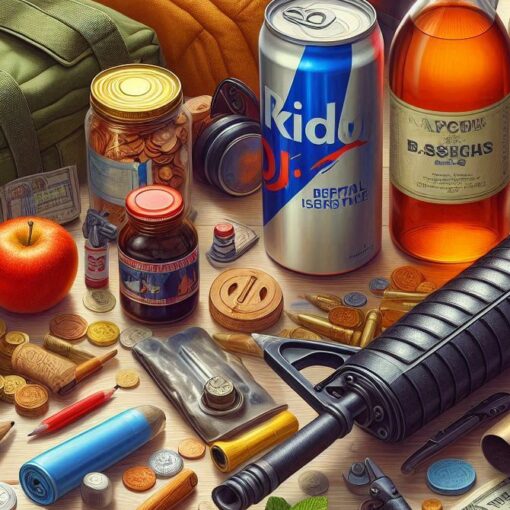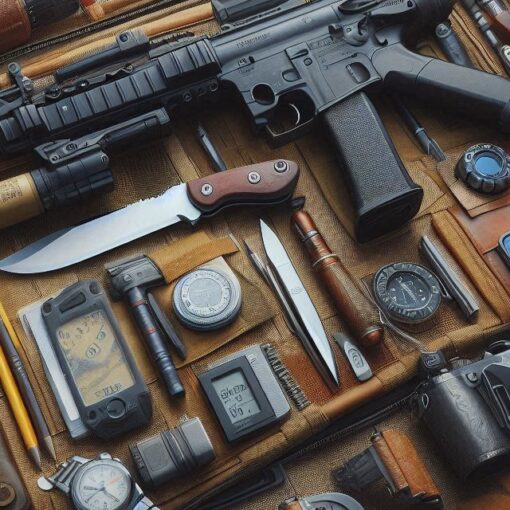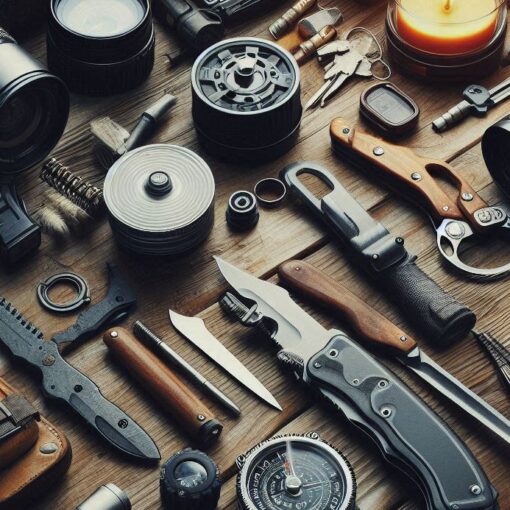Top Takeaways and Key Concepts
- Start with what you already own to avoid wasting money on duplicate supplies.
- Buy non-perishable essentials in bulk to cut costs and build supplies faster.
- Create DIY gear using household items like cotton balls, jars, and old backpacks.
- Use sales, coupons, and discount stores to stock up cheaply on survival items.
- Learn bartering and practical skills to trade goods or services during tough times.
Summary of This Article
This article explains how to prepare for emergencies without spending a fortune by using smart, budget-friendly strategies. It starts by encouraging readers to look around their homes for usable survival items before buying anything new. It emphasizes buying long-lasting foods in bulk to save money, teaming up with others to split costs, and getting creative with DIY survival gear like homemade fire starters and repurposed bags. The article also highlights using coupons, seasonal sales, and discount stores to score deals. Finally, it encourages learning bartering skills and trading knowledge or goods, making preparedness both affordable and practical.
Short Video Version of this Article
Let’s be honest. Getting ready can seem really expensive. You can see all the sophisticated gadgets, freeze-dried meals, and first aid supplies. You need a treasure chest just to get started! But don’t worry.
You can get ready without spending a lot of money. It’s like adding a few additional toppings to plain ramen noodles to make them taste better. It’s all about being smart and getting amazing discounts!
Please Note: This post may contain affiliate links. If you click one of them, we may receive a commission at no extra cost to you. As an Amazon Associate, I earn from qualifying purchases.

Check out the sales at your local businesses first. They may have fantastic deals on canned items and dry foods that last a long time. You might be surprised at what you can get at dollar stores.
Check out your home as well. You might find things you already have that could help in an emergency, such old flashlights or blankets that are hiding in the closet.
Buying in large amounts is also a good idea. When you share expenditures with friends or family, everything is cheaper! Also, everyone gets to enjoy the benefits of sharing commodities.
When it comes to gear, don’t be afraid to think outside the box. Simple tools function just as well as fancy technology. A strong backpack can hold everything you need without breaking the bank.
Knowing you’re ready without spending a lot of money feels fantastic. So fetch that food and let’s make something together!
Start with What You Have
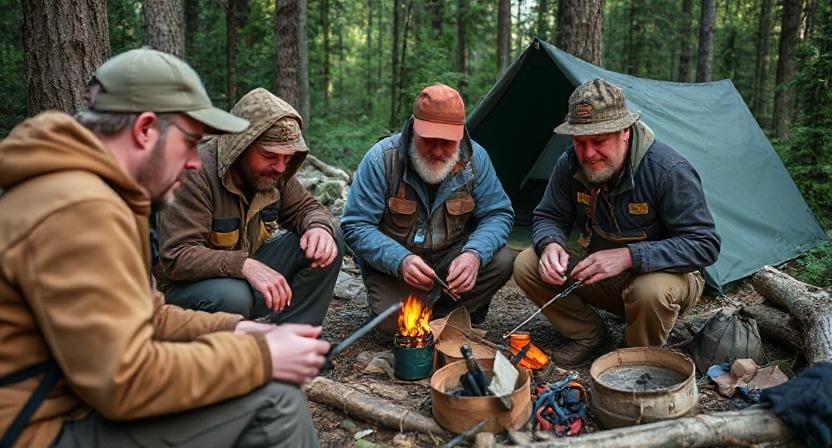
Before you dash out to grab every shiny survival tool, let’s pause for a moment. Have you looked around your home? You might have lots of stuff that can help in a crisis. It’s like finding hidden treasure!
Old blankets are great for keeping warm. Those empty soda bottles? Perfect for storing water! And what about those cans of soup tucked away in the back of your pantry? They could be useful for trading when times get tough.
Take a little time to make a list of what you already have. You might find you’re sitting on a goldmine of prepper goodies without even knowing it! This is also a chance to tidy up those messy cabinets. It’s like spring cleaning but with way more purpose—and less dust everywhere!
You’ll feel good seeing everything laid out. Plus, it saves money too! No need to buy things you don’t really need when you’ve got useful items right at home. So, grab that coffee and start exploring your space. You might be surprised by what you find!
Buy in Bulk
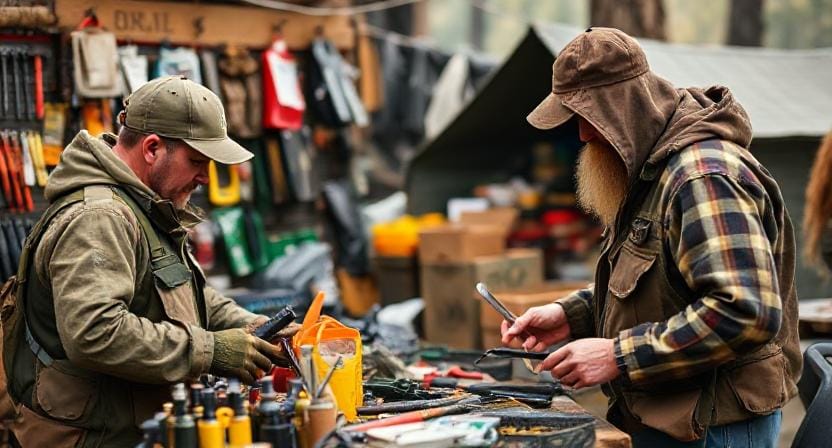
Now that you’ve assessed what you’ve got, let’s talk about buying in bulk. This strategy is like going to Costco but without needing a membership card or getting lost among the giant jars of pickles.
Purchasing non-perishable foods in larger quantities often means lower prices per item. Think rice, beans, pasta—basically all the ingredients for your future “survival chef” career.
You know what’s cool? Many grocery stores have bulk sections. You can fill up containers with just the right amount of food you need. Not too much, not too little. It’s super handy!
And don’t forget about warehouse sales or discount stores. Seriously, you’d be amazed at how many useful things are just waiting for a new home at really low prices. It feels like a treasure hunt sometimes!
Sharing is caring, right? Team up with friends or family who want to prep too. You can split those bulk purchases! Everyone gets what they need without breaking the bank. Plus, no one wants to end up with 50 pounds of quinoa all by themselves. That would be way too much!
Imagine having fun while stocking up together. You could make it a little adventure—grab some snacks, chat about your plans, and save money all at once! How great is that? So grab your buddies and start planning your next shopping trip!
DIY Survival Gear
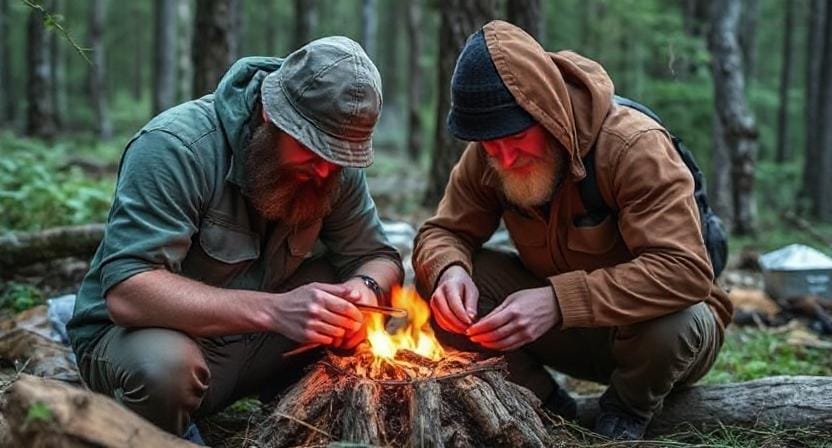
Let’s see… if there’s one thing I’ve learned from camping trips gone awry (and believe me, there have been many), it’s that sometimes improvisation is key! Making your own survival gear not only saves money but also gives you valuable skills along the way.
For example, instead of shelling out big bucks for fire starters or lanterns designed by rocket scientists (seriously?), consider making them yourself using household materials.
You know what’s really cool? Cotton balls dipped in petroleum jelly make awesome fire starters. Seriously, it’s like you’re a little survival genius when you pull that off! You just take a cotton ball, dip it in the jelly, and boom—instant fire starter. It’s super handy for camping or emergencies.
Have you ever thought about making candles from old crayons? They work great! Just melt them down and pour them into a container. They’ll light up your space way better than those fancy store-bought ones. Plus, it’s fun to get creative!
Repurposing stuff is another smart idea. An old backpack can turn into an amazing bug-out bag with just a little creativity. Look through your drawers and see what you’ve got lying around. Old flashlights, first aid kits, even extra clothes can fit right in there.
Honestly, every little bit helps when you’re trying to save money. It feels good to use what you already have instead of buying new things all the time. So grab some cotton balls and crayons next time you’re feeling crafty! You’ll be surprised at how much fun it can be!
Take Advantage of Sales and Coupons

Oh, you know what I really love? Finding free Wi-Fi at my local coffee shop. That’s a big win! But you know what else gets me excited? Snagging great deals with sales and coupons! Many grocery stores have weekly promotions on canned goods and other staples that are perfect for prepping.
Have you heard about store loyalty programs? They’re like little treasure chests of savings. Signing up is super easy, and then you get access to digital coupons. It’s like finding extra candy in your Halloween bag! Those discounts pop up just when you need them most, which is so helpful.
Keeping an eye on seasonal sales is another smart move. You can find amazing deals if you look carefully. For example, buying winter supplies during summer clearance events can save you a ton of money. You might even think someone marked everything down by mistake because it looks too good to be true!
It feels great to save money while stocking up on essentials. Plus, who doesn’t love the thrill of a good deal? So keep your eyes peeled next time you’re shopping! You never know what treasures you’ll find!
Bartering Skills
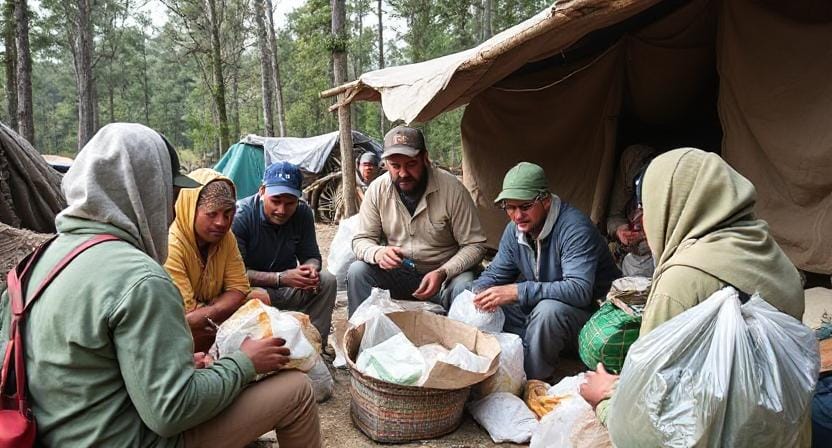
So, here’s something interesting to think about. Let’s speak about how to trade things! I know that sounds strange coming from someone who collects bizarre things, but please listen. When times are hard and money isn’t worth much—like last week’s leftovers (ew!)—trading products becomes very vital.
You can also use your skills to trade. You might be great at making bread or sewing garments. When it comes to bartering, those abilities are worth their weight in gold! Imagine this: a person has extra canned vegetables but needs help mending their bike tire. You may swoop in and make a deal. Everyone benefits!
Before you start bartering, it’s a good idea to stock up on some basic things. You can do anything you want once you have what you need! You’ll be exchanging stuff all over the place and feeling like a pro at it.
So, think about what you can give. It might be anything, like making cookies or helping with repairs around the house. Bartering can also help people get along. People come together when they share abilities, especially when times are rough. That’s so cool!
Frequently Asked Questions
What is the cheapest way to start prepping?
The best way to start prepping on a budget is to begin with items you already own. Look around your home for useful supplies like blankets, tools, storage containers, and canned food before buying anything new.
What food should I buy first if I’m prepping on a budget?
Focus on affordable, long-lasting items like rice, pasta, canned soups, beans, and oats. These foods are inexpensive, filling, and have a long shelf life, making them perfect for building your stockpile slowly.
How can I save money on survival gear?
Skip expensive gadgets and look for simple, multi-use tools. Check discount stores, thrift shops, garage sales, and online marketplaces. You can also make some gear yourself using items like old backpacks, jars, or paracord.
Are DIY survival tools reliable?
Yes, many DIY survival tools work well if made correctly. Simple items like cotton ball fire starters, crayon candles, and homemade first aid kits are cost-effective and can be just as reliable as store-bought options.
How do I build my supplies without overspending?
Stock up gradually rather than buying everything at once. Use coupons, weekly sales, and bulk discounts to stretch your budget. Share bulk purchases with friends or family to reduce costs even more.
What skills should I learn for budget prepping?
Learn basic DIY and survival skills like making fire starters, repairing clothes, cooking from scratch, purifying water, and gardening. These skills save money and give you independence during emergencies.
Why is bartering important in survival situations?
Bartering lets you trade goods or skills when money isn’t useful. Learning simple skills like baking, repairing tools, or first aid gives you something valuable to trade, helping you build a support network during hard times.
Suggested Resources:
Prepper’s Long-Term Food Storage Guide
https://www.prepper.com/long-term-food-storage-guide
How To Build a Bug Out Bag on A Budget
https://www.bugoutbag.com/build-on-a-budget
DIY Survival Gear Ideas
https://www.survivalskills.com/diy-survival-gear

Kevin Collier is a seasoned outdoor enthusiast and writer for Trekbug.com, specializing in outdoor adventures, survival strategies, and prepping insights. With a deep love for nature and a commitment to self-sufficiency, Kevin empowers readers to embrace the wilderness confidently. He shares valuable tips, practical techniques, and inspiring stories, helping both novice and experienced adventurers develop essential skills for surviving and thriving in the great outdoors.


